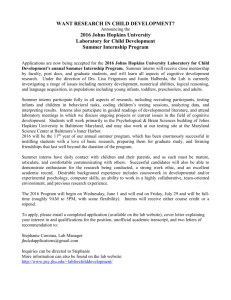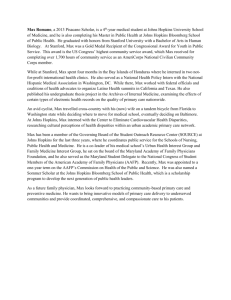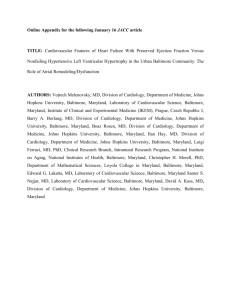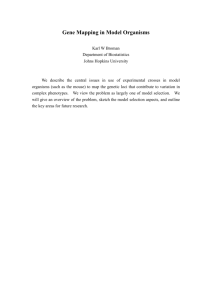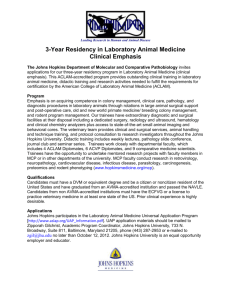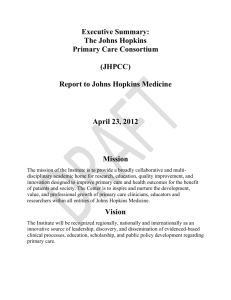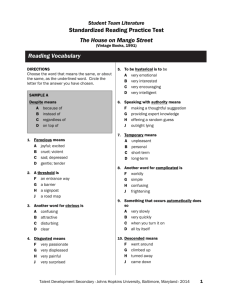Bud-Not-Buddy-SRPT-s.. - Talent Development Secondary
advertisement
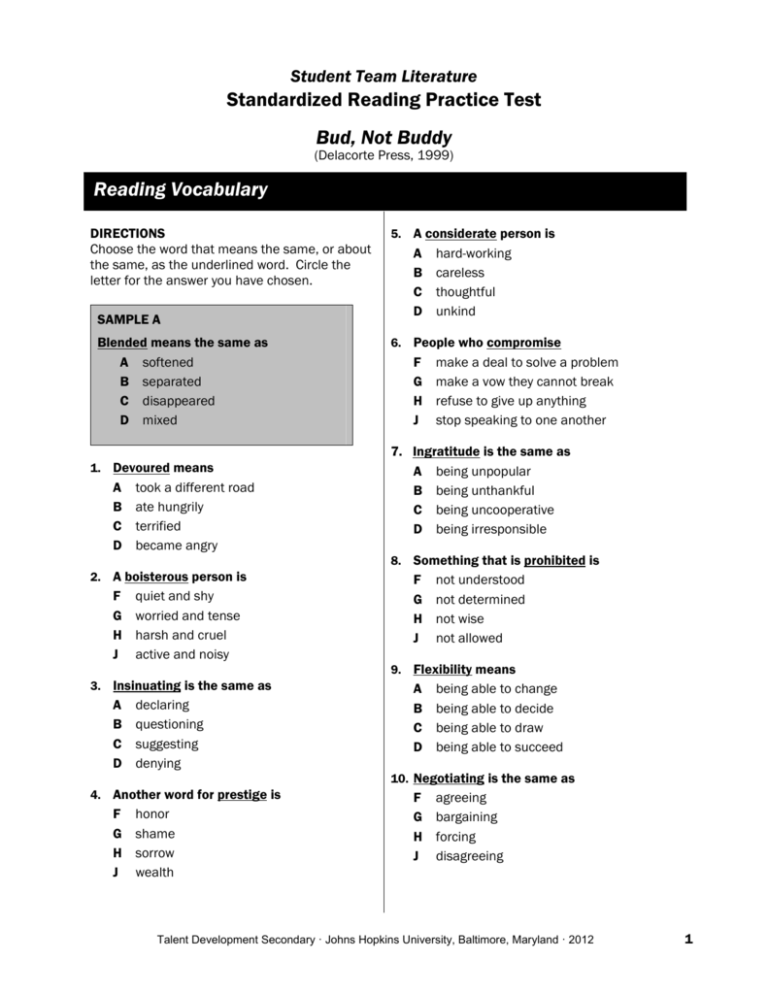
Student Team Literature Standardized Reading Practice Test Bud, Not Buddy (Delacorte Press, 1999) Reading Vocabulary DIRECTIONS Choose the word that means the same, or about the same, as the underlined word. Circle the letter for the answer you have chosen. SAMPLE A Blended means the same as A softened B separated C disappeared D mixed 1. Devoured means A B C D took a different road ate hungrily terrified became angry 2. A boisterous person is F G H J quiet and shy worried and tense harsh and cruel active and noisy 3. Insinuating is the same as A B C D declaring questioning suggesting denying 4. Another word for prestige is F G H J honor shame sorrow wealth 5. A considerate person is A B C D hard-working careless thoughtful unkind 6. People who compromise F G H J make a deal to solve a problem make a vow they cannot break refuse to give up anything stop speaking to one another 7. Ingratitude is the same as A being unpopular B being unthankful C being uncooperative D being irresponsible 8. Something that is prohibited is F G H J not understood not determined not wise not allowed 9. Flexibility means A B C D being able to change being able to decide being able to draw being able to succeed 10. Negotiating is the same as F G H J agreeing bargaining forcing disagreeing Talent Development Secondary · Johns Hopkins University, Baltimore, Maryland · 2012 1 DIRECTIONS Read the sentence in the box, then choose the answer in which the underlined word is used in the same way. Circle the letter for the answer you have chosen. SAMPLE B I couldn’t believe I’d spent the whole day reading! The librarian’s words snapped a spell that was on me, and my stomach started growling right away. In which sentence does the word spell mean the same thing as in the sentence above? A I usually check the dictionary when I’m not sure how to spell a word. B The dry spell lasted so long that all the plants in Mama’s garden were dying. C The princess was under a spell that made her sleep for a hundred years. D Aunt Jen worked for a temporary employment agency for a short spell before she began her present job. 11. One of the cops said, “I don’t like these odds. Mr. Pinkerton ain’t paying me enough to do this.” He threw his cop hat and his billy club on the ground. In which sentence does the word club mean the same thing as in the sentence above? A My mom belongs to a book club that meets every Wednesday evening. B Darin makes a lot of money as a caddy at the golf club on weekends. C Dad used a baseball bat as a club to kill the rat he cornered in the tool shed. D Uncle Jeff’s band is playing at the club every night this week. 12. I was carefuller talking to him this time so he couldn’t track where I was. I turned my head and talked sideways out of my mouth like one of those ventriloquists. In which sentence does the word track mean the same thing as in the sentence above? 2 F We heard the train coming down the track right on schedule. G The weather experts are using scientific instruments to track the storm so they can predict when it will arrive. H The squirrels left a track of paw prints in the snow on my windowsill. J Jamal is a really fast runner, so he plans to go out for track in high school. 13. I could jam the chair up against the one door’s knob, and I’d have to scooch the table with the mirror over up against the other one. In which sentence does the word jam mean the same thing as in the sentence above? A Mr. Herndon had to jam the window open with a block of wood to let in some fresh air. B Deirdre only likes sandwiches made with peanut butter and strawberry jam. C “You have to help me,” Donovan begged. “I’m in a terrible jam right now.” D The musicians get together for a jam session every Friday evening from six to eleven. 14. Steady Eddie said, “Don’t thank me until you’ve been through a couple of hours of blowing scales on this recorder. We’ll see if you’re still grateful then.” In which sentence does the word scales mean the same thing as in the sentence above? F The butchers weigh the meat on the scales, then wrap it in white paper and give it to the customers. G Dad always scrapes the scales off the fish and removes the head and tail before he grills it. H Mr. Miller had the chorus singing scales to warm up before the rehearsal began. J Using his super powers, Spiderman scales the building and rescues the children on the top floor just in time. Talent Development Secondary · Johns Hopkins University, Baltimore, Maryland · 2012 DIRECTIONS As you read each sentence, use the other words in the sentence to help you figure out what the underlined word means. Circle the letter for the answer you have chosen. SAMPLE C Mr. Amos handed me the blanket and pillows and gave me another nudge. I took two more baby steps into the shed. A nudge is-A a hard shove. B a pinch. C a gentle push. D a kick. 15. Me, Bugs, a little white boy and a little girl loaded a whole mess of dirty tin cans and spoons into a big wooden box and lugged them down to Thread Crick to wash them. Lugged means-A pushed B carried C tossed D rolled 16. The librarian said, “There’s no need for you to look so stricken. It’s not bad news, young man.” Stricken means -F impatient G angry H delighted J upset 17. “And look at the condition of the boy’s clothes,” the woman said. “Everything is either too small for him or almost in tatters. Where is this child’s mother?” In tatters means -A in rags B in baskets C in style D in season 18. “Mr. Calloway used to crow about how his mother and father had been born slaves and how now, only two generations later, one of them was actually going to be a teacher,” Miss Thomas explained. Crow means -F to complain G to brag H to scoff J to sing 19. “Mr. Calloway could use some young, wiry hands to help him around,” Miss Thomas said. “Think you can handle that?” Now I knew for sure she’d looked at my legs, she must’ve thought I was a real weakling. Weakling means -A a person who is not very happy B a person who is not very strong C a person who is not very musical D a person who is not very intelligent 20. One of the most enjoyable parts of writing is that an author can combine his or her imagination with the traits of real people to build new characters. Traits means -F weaknesses G clothing H features J requests Talent Development Secondary · Johns Hopkins University, Baltimore, Maryland · 2012 3 Reading Comprehension DIRECTIONS Read each passage, then read each question about the passage. Decide which is the best answer to the question. Circle the letter for the answer you have chosen. SAMPLE: (from chapter 5) I headed back to the Christmas trees planted alongside the library. They were low enough to the ground that no one could see me unless they were really looking, so I started opening my suitcase. Most folks don’t have enough sense to carry a blanket around with them, but you never know when you might be sleeping under a Christmas tree at the library so I always keep mine handy. I untied the strange knots the Amoses had put in my twine and opened the suitcase. I could tell right away that someone had been fumbling through my things. First off, whenever I put the blanket in, I always fold it so that it stops all the other things from banging up against each other, but those doggone Amoses had just stuffed it in without paying no mind to what it was mashing up against. I lifted the blanket out and saw that everything else was still there. You might be able to say that the Amoses were some mean old nosy folks, but you couldn’t call them thieves. I picked up the old tobacco bag that I keep my rocks in. I could tell by the way the drawstring was pulled that the Amoses had been poking through this too. I jiggled it up and down in my hand a couple of times and it felt like none of the rocks was missing but I opened it to count them anyway. None of them was gone. Next I pulled Momma’s picture out of the envelope I kept it in and held it so the light from the library’s side door would shine down on it. It looked like the Amoses hadn’t hurt it. This was the only picture of Momma in the world. Running acrost the top of it was a sign that was writ on a long skinny flag, it said, BOYS AND GIRLS – FOLLOW THE GENTLE LIGHT TO THE MISS B. GOTTEN MOON PARK. Underneath the sign, between two big wagon wheels, was Momma. 1. Which of the following is not a clue that tells the narrator that the Amoses have been snooping through his things? A They tied strange, unfamiliar knots in the twine holding his suitcase closed. B They stuffed his blanket back into the suitcase carelessly instead of folding it. C They emptied the rocks out of his drawstring bag. D They tightened the drawstring on the bag in a different way from the way he had left it. 4 2. From the information given in this passage, we can conclude that the things in the suitcase are important to the narrator mainly because F he is a rock collector. G they cost a lot of money. H they are very old. J they remind him of his mother. Talent Development Secondary · Johns Hopkins University, Baltimore, Maryland · 2012 (from chapter 8) I moved out from behind our tree and walked over toward the biggest fire, I waited until some folks noticed me, then said, “Excuse me, is this here Hooperville?” The man who was playing the mouth organ stopped and everyone else around the fire looked up at me. One of the white men said, “What is it you looking for?” I said, “A city called Hooperville, sir.” They all laughed. The mouth organ man said, “Naw, son, what you’re looking for is Hooverville, with a v, like in President Herbert Hoover.” I said, “Oh, is this it, sir?” The man said, “This is one of them.” I said, “One of them?” He answered, “They’re all over the country, this here is the Flint version.” “And all of them are called Hooverville?” “That’s right, Mr. Hoover worked so hard at making sure every city has got one that it seems like it would be criminal to call them anything else.” Someone said, “That’s the truth!” I said, “Well, how’re we going to know if we’re in the right one?” The mouth organ man said, “Are you hungry?” “Yes, sir.” “Are you tired?” “Yes, sir.” “Are you scared about what’s going to happen tomorrow?” I didn’t want anyone to think I was a baby so I said, “Not exactly scared, sir, maybe I am a little bit nervous.” The man smiled and said, “Well, son, anyplace where there’re other folks in need of the same things that you are is the right place to be. This is exactly the Hooverville you’re looking for.” I knew what the man was trying to say. This was the exact same kind of circle-talking and crosstalking that Momma used to do. Bugs hadn’t had that kind of practice, he came from behind the tree and said, “I don’t get it, you said there were Hoovervilles all over the place, what if we was looking for the Hooverville in Detroit or Chicago, how could this be the right one to be in?” The man said, “You boys from Flint?” I said, “Yes, sir.” The man waved his mouth organ like a magic wand and pointed it all over the little cardboard city. “Boys,” he said, “look around you.” The city was bigger than I thought it was. The raggedy little huts were in every direction you looked. And there were more people sitting around than I first thought too, mostly it was men and big boys, but there were a couple of women every now and then and a kid or two. They were all the colors you could think of, black, white, and brown, but the fire made everyone look like they were different shades of orange. There were dark orange folks sitting next to medium orange folks sitting next to light orange folks. “All these people,” the mouth organ man said, “are just like you, they’re tired, hungry and a little bit nervous about tomorrow. This here is the right place for y’all to be ’cause we’re all in the same boat. And you boys are nearer to home than you’ll ever get.” GO ON TO THE NEXT PAGE Talent Development Secondary · Johns Hopkins University, Baltimore, Maryland · 2012 5 1. The narrator of this account is probably A B C D The following sentences are an example of symbolism (the use of physical objects, colors, etc. to represent ideas). an old man. a young boy. President Herbert Hoover. a man with a mouth organ. “[The people] were all the colors you could think of, black, white, and brown, but the fire made everyone look like they were different shades of orange. There were dark orange folks sitting next to medium orange folks sitting next to light orange folks.” 2. The mouth organ man’s explanation of why the cardboard city is called Hooverville is an example of F verbal irony. G situational irony. H structural irony. J symbolism. 4. What is the main idea of the symbolism? F Suffering makes people more aware of the differences between them. G People who are suffering just want to stay with “their own kind.” H The worst kind of suffering is suffering because of race and color. J Shared suffering brings people together no matter what their race or color. 3. We can infer that most people living in Hooverville A blame President Herbert Hoover for the country’s bad economic situation. B have lost their jobs and homes. C Both A and B. D Neither A nor B. The Venn diagram below shows some similarities and differences between the narrator and the people around the fire. 5. Which of the following belongs in the space marked “X”? A Well informed B Worried about the future C Black D White The narrator Inexperienced Young Both The people around the fire Tired Experienced Hungry Mostly adults “X“ GO ON TO THE NEXT PAGE 6 Talent Development Secondary · Johns Hopkins University, Baltimore, Maryland · 2012 (from chapter 12) [Mr. Lewis] laughed and said, “Ah, you’re a lot smarter than you look, Bud, you know it would’ve been curtains for us if that copper would’ve seen what’s in there.” He tapped the top of the box. All I could say was, “Yes, sir.” He said, “Go ahead and open it. But! You have to promise—no, you have to swear that you won’t breathe a word about what you see to anyone.” “Mr. Lewis, sir, I’d really rather take a nap.” “Well, first open the box.” I took in a big gulp of air and started to raise the top of the box. Lefty Lewis yelled, “Bud!” I jumped so high I nearly banged my head on the roof of the car. I yelled back, “Yes, sir?” “I didn’t hear you swear to keep your lips locked.” “Aw, shucks, Mr. Lewis, I swear, but I’d feel a lot better if I could take a doggone nap.” I snatched the top off the box and got ready to be scared to death. It was just some paper with writing on it. Maybe the pistol or the loot was under all this paper. I kept lifting paper until I got to the bottom of the box. Nothing! I looked at Lefty Lewis. He said, “I warned you, pretty dangerous, isn’t it?” I must’ve missed something. I went through the box again. “How’s some paper dangerous, sir?” “Read it.” I took one of the papers out, it said: ATTENTION RAILROAD WORKERS THE NEWLY FORMED GRAND RAPIDS BRANCH OF THE BROTHERHOOD OF PULLMAN PORTERS WILL BE HOLDING AN INFORMATIONAL MEETING ON WEDNESDAY, JULY 23, 1936. ALL INTERESTED PARTIES PLEASE COME TO 2345 COLDBROOK AT 9:00. REFRESHMENTS WILL BE SERVED. YOU KNOW WHAT WE’RE UP AGAINST— PLEASE KEEP THIS AS CONFIDENTIAL AS POSSIBLE. It was starting to make sense. I said, “Mr. Lewis, are you one of those labor organizers?” He laughed. “Not really, Bud. I’m picking these up so we can pass them out in Grand Rapids. We’ve been negotiating to get a union for the Pullman porters for years now and nowhere in Grand Rapids will print these flyers for us. The only place that would do them is all the way in Flint. You were running away to a pretty hot town, young man.” “Wow!” 6. In this selection, the phrase “it would’ve 7. At first Mr. Lewis’ comments about what is been curtains for us” means in the box make Bud feel F “we would have gotten new curtains.” A curious and excited. G “we would have won a prize.” B calmed and comforted. H “we would have been in serious C angry and upset. trouble.” D nervous and uncomfortable. J “we would have been hiding in the GO ON TO THE NEXT PAGE curtains.” Talent Development Secondary · Johns Hopkins University, Baltimore, Maryland · 2012 7 8. At first Bud really believes there is something dangerous in the box. This is an example of F an unreliable narrator. G verbal irony. H an extended metaphor. J the third person point of view. 9. We can infer that no one in Grand Rapids 10. Mr. Lewis uses verbal irony in describing the contents of the box as very dangerous. His purpose in doing this is F to make Bud feel afraid of labor unions. G to show how silly it is to be afraid of labor unions. H to show how tricky labor unions can be. J to show how important it is to organize labor unions. would print up the flyers because A the police disapprove of union activities. B there is a shortage of paper in Grand Rapids. C they don’t have the right kind of printing presses in Grand Rapids. D the union workers are connected to organized crime mobs. GO ON TO THE NEXT PAGE 8 Talent Development Secondary · Johns Hopkins University, Baltimore, Maryland · 2012 (from chapter 17) … someone yelled out, “One, two, one two three!” The Thug was brushing his sticks across the round gold metal thing next to his drums and making it sound like a soft rain was commencing to fall on someone’s tin roof. Only instead of sounding like rain splashing anytime it wanted to, the Thug had it sounding like it was coming down in a steady, bouncing way. Then Dirty Deed started making the piano sound like it was a kind of drum, for a second it fell right in with the rain pats that the Thug was making, then it took off and made you think of what Niagara Falls must sound like, it sounded like big, bright drops of water splashing up and over, over and up. The drops would fall loud and clear as anything, then before you knew it they were right back into the Thug’s steady, bouncy beat. Steady Eddie started snapping his fingers real soft, in time with the piano and the drum, his toothpick jumping right along with his fingers. He put his ax in his mouth and blew, but instead of the horn making music it seemed like Steady made it talk. He blew one long, low, rumbly sound and I knew right then, with that one deep, sad moan, what the most beautiful sound in the world was. Steady held the note for a long time, then made the sax drift away from the rest of the storm of music. It swirled and floated back and joined the rain sound that the Thug and Dirty Deed kept going. I just stood there. I didn’t even hear Miss Thomas and Mr. Jimmy and Herman E. Calloway come up from behind me. Miss Thomas rubbed her hand acrost my head and said, “Bud, you’ve done a great job, the place is sparkling.” I was going to say, “Thank you, ma’am,” but seemed like talking was wrong what with all these wonderful sounds were coming from the people on the stage. Mr. Jimmy said, “LaBone, looking good, son.” Herman E. Calloway grunted and the three of them walked up on the stage. Mr. Jimmy picked up his horn and joined in the storm. Miss Thomas sat on a stool, closed her eyes and ducked her head up and down, up and down. Herman E. Calloway stood next to his giant fiddle and started bobbing his head too. He put one of his hands near the top of the fiddle and began pulling at the strings with his other hand. Every time he patted the strings it seemed like something wide and heavy was walking by slow and easy. Or it seemed like he was the thunder, soft and far away but getting closer all the time. Fill in the blank: 11. In this selection, the author uses an ____________________, comparing a music rehearsal to a thunderstorm. A unreliable narrator B allusion C extended metaphor D ironic tone 12. The word “ax” in the fourth paragraph refers to F a tool for chopping wood. G a guitar. H a saxophone. J a microphone. 13. Miss Thomas congratulates Bud for A learning music so quickly. B doing such a good job of cleaning. C making friends with Mr. Calloway. D being so quiet while the band rehearses. 14. Bud’s feeling while he listens to the rehearsal is one of F awe and amazement. G sorrow and disappointment. H surprise and confusion. J confidence and pride. GO ON TO THE NEXT PAGE Talent Development Secondary · Johns Hopkins University, Baltimore, Maryland · 2012 9 The chart below shows some of the musicians, their instruments, and what their music reminds Bud of. 15. Which of the following belongs in the space marked “X”? A B C D 10 Steady Eddie/ the saxophone Miss Thomas/ the vocals Mr. Calloway/ the big bass fiddle Mr. Jimmy/ the trumpet Musician/ Instrument What It Sounds Like The Thug/ the cymbal and drums Rain falling steadily on a tin roof Dirty Deed/ the piano Big drops of water splashing up and over a waterfall X Soft, faraway thunder Talent Development Secondary · Johns Hopkins University, Baltimore, Maryland · 2012
